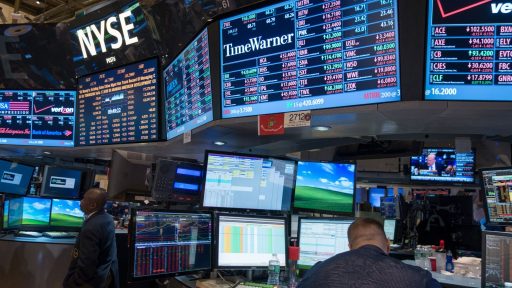- Home
- >
- Fundamental Analysis
- >
- Fed officials fear financial market ‘imbalances’ and possibility of ‘sharp reversal’ in prices

Fed officials fear financial market 'imbalances' and possibility of 'sharp reversal' in prices

Federal Reserve officials expressed largely optimistic views of economic growth at their most recent meeting but also started to worry that financial market prices are getting out of hand and posing a danger to the economy.
Minutes from the Oct. 31-Nov. 1 Federal Open Market Committee meeting indicate members with almost universally positive views on growth — the labor market, consumer spending and manufacturing all were showing solid gains. While there were disagreements on the pace of inflation, and even a discussion about changing the Fed's approach to price stability, the sentiment otherwise was largely positive.
Moreover, they said the picture could get even better if Congress lowers corporate taxes as part of the reform plan making its way through the Senate.
"In their discussion of the economic situation and the outlook, meeting participants agreed that information received since the FOMC met in September indicated that the labor market had continued to strengthen and that economic activity had been rising at a solid rate despite hurricane-related disruptions," the minutes stated.
However, when it came to evaluating market conditions, the talk took a more cautious tone.
Stocks have been on a tear throughout 2017, setting a series of record highs and adding trillions in value. That's come both on the heels of stronger corporate earnings and hopes that the tax reform plan, which would take the corporate rate from 35 percent to 20 percent, becomes a reality.
Some members feared what would happen if the market suddenly took a hit.
"In light of elevated asset valuations and low financial market volatility, several participants expressed concerns about a potential buildup of financial imbalances," the minutes said. "They worried that a sharp reversal in asset prices could have damaging effects on the economy."
Concerns about the surge in stocks are not new at the Fed, but most officials have downplayed the idea that the market is in a bubble. Wall Street also has been at odds about the market, with Bank of America Merrill Lynch warning of a market top coming in 2018 though Goldman Sachs has predicted another big year.
Some members said the bull market was justified by a continued low "neutral" rate of interest that is neither overly restrictive nor accommodative to growth.
And there also was mention of "regulatory changes" that had helped "an appreciable strengthening of capital and liquidity positions in the financial sector over recent years," which made the system less prone to shocks or sudden market drops.
President Donald Trump has taken a three-pronged approach to economic growth and frequently boasts of the stock market gains. In addition to tax reform, he has cut business regulations and is expected in the coming months to unveil a plan to boost infrastructure spending.
During the year, economic growth has increased, with GDP gaining 3.1 percent and 3 percent the past two quarters and on track to be around the same level in the fourth quarter.
FOMC members noted multiple areas of positive developments. The labor market is "operating at or above full employment," GDP is likely to "grow at a pace exceeding that of potential output," and even inflation has been slowed only by "temporary or idiosyncratic factors."
But on inflation, the consensus was weaker, with some members disagreeing with the notion that all the softness was due to issues that would fade.
Also at the meeting, members discussed the well-publicized reduction of the Fed's $4.5 trillion balance sheet. Under the plan, the central bank is letting a capped level of proceeds from the bonds it owns run off each month. Fed officials agreed the program thus far has run smoothly.
Source: Bloomberg Pro Terminal
Jr Trader Alexander Kumanov
 Varchev Traders
Varchev Traders Read more:
If you think, we can improve that section,
please comment. Your oppinion is imortant for us.











